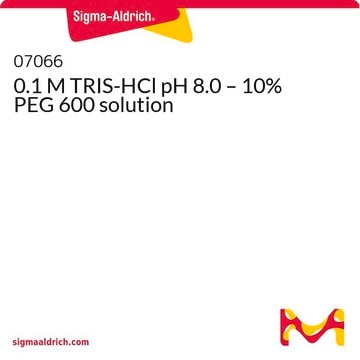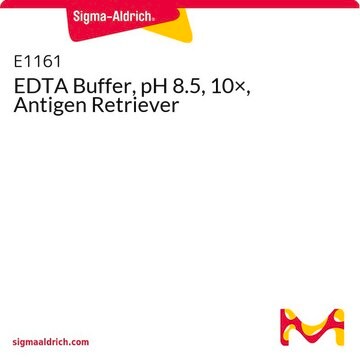Recommended Products
Application
Tris-HCl Buffer, pH 10, 10×, Antigen Retriever has been used as a heat-induced antigen retriever on formalin-fixed paraffin-embedded (FFPE) tissue sections prior to application of antibodies. In immunohistochemistry (IHC), most commonly used fixatives such as formalin mask tissue antigens (cellular, membrane, and nuclear) by their intrinsic crosslinking. This masking results in poor or no staining in IHC. The use of Tris-HCl buffer, pH 10, or other antigen retrieval solutions on FFPE tissue sections improves accessibility of antibodies to tissue antigens.
Preparation Note
Dilute the Tris-HCl Buffer, pH 10, 10×, and Antigen Retriever 10-fold with water to prepare a 1 × Working Solution, e.g., dilute 10 mL of 10 × concentrate with 90 mL of water.
Storage and Stability
Store the product at 2–8 °C. Do Not Freeze to prevent possible precipitation.
Other Notes
Occasionally the buffer may contain a yellowish tinge. This is due to preservative and will not affect the function of the buffer. Store the prepared 1′ Tris-HCl Buffer, pH 10, Working Solution at 2–8 °C.
Signal Word
Warning
Hazard Statements
Precautionary Statements
Hazard Classifications
Skin Sens. 1
Storage Class Code
12 - Non Combustible Liquids
WGK
WGK 3
Flash Point(F)
Not applicable
Flash Point(C)
Not applicable
Certificates of Analysis (COA)
Search for Certificates of Analysis (COA) by entering the products Lot/Batch Number. Lot and Batch Numbers can be found on a product’s label following the words ‘Lot’ or ‘Batch’.
Already Own This Product?
Find documentation for the products that you have recently purchased in the Document Library.
Customers Also Viewed
High expression of stromal PDGFRβ is associated with reduced benefit of tamoxifen in breast cancer.
Paulsson J, et al.
The journal of pathology. Clinical research, 3(1), 38-43 (2017)
S R Shi et al.
The journal of histochemistry and cytochemistry : official journal of the Histochemistry Society, 43(2), 193-201 (1995-02-01)
Antigen retrieval (AR) incorporating high-temperature microwave (MW) heating of tissue sections before immunostaining is a revolutionary technique that can unmask the antigens in formalin-fixed tissue sections, thus making them available for immunohistochemical staining. Although high temperature is believed to be
Hilde Ytre-Hauge Smeland et al.
BMC cancer, 19(1), 234-234 (2019-03-17)
Cancer progression is influenced by a pro-tumorigenic microenvironment. The aberrant tumor stroma with increased collagen deposition, contractile fibroblasts and dysfunctional vessels has a major impact on the interstitial fluid pressure (PIF) in most solid tumors. An increased tumor PIF is
Our team of scientists has experience in all areas of research including Life Science, Material Science, Chemical Synthesis, Chromatography, Analytical and many others.
Contact Technical Service






